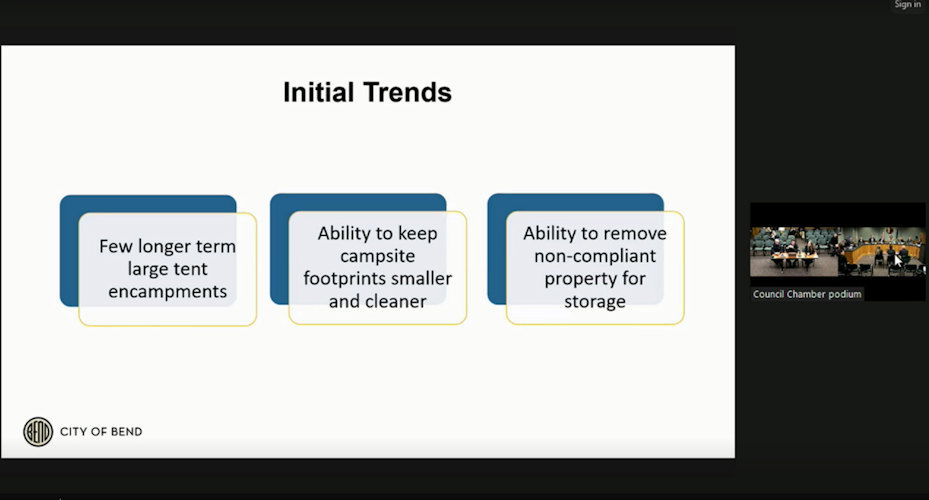One stat in Bend’s 8-month report card on new camping code might surprise many: No citations have been issued

Fuzzy parking rules are a factor, face 2024 cleanup -- and building, planning fees face double-digit hikes
BEND, Ore. (KTVZ) – Of all the slides and stats and details laid out in an eight-month progress report on the city of Bend’s new camping code Wednesday night, perhaps the most surprising number of all was: zero.
“We have not issued a citation under the camping code violation,” Police Chief Mike Krantz told city councilors. While there have been plenty of notices to move or clean areas, and property stored, “we haven’t cited anybody, sent anybody to Muni Court,” the chief said.
Krantz noted various reasons – as the city’s administrative policy notes, “Citations will be issued only when other means of achieving compliance have been unsuccessful or are not practicable for the particular situation.“ That’s generally true for other code enforcement issues, for example, not just in dealing with the city’s surge of homeless and rise in related parking or camping complaints in the past few years.
The police chief also said it's understood that a ticket “might not influence behavior,” But as Krantz and Assistant City Attorney Ian Leitheiser pointed out, there’s also a lack of clarity about the current requirement to move a vehicle 750 feet every 72 hours and where it applies.
In fact, Leitheiser said city staff plans to come back to councilors, probably next year, with an effort to revise and clear up ambiguities in the city’s overall parking rules – where they apply and to whom. At this point, they plan to propose that the requirement to move vehicles 750 feet after three days apply city-wide, for all vehicles.
Councilor Barb Campbell said that 72-hour figure initially was in place to, for example, not penalize a resident who leaves a car parked on the street while away for a three-day weekend.
But since the new camping code took effect, the city has seen few longer-term, large tent encampments, and has been able to keep those still in the city smaller and cleaner, while removing non-compliant property for storage.
Vehicles are a messier situation, and while city police and community service officers get an average of 10 calls a day about parking complaints or abandoned vehicles, storage capacity is limited.
“The city has the authority to tow, but to be blunt, we don’t want to use it,” Leitheiser said. “We’re still lucky to get a lot of voluntary compliance.”
Sherri Meisel, who’s been on the streets to explain and enforce the code as health and safety compliance coordinator, noted the surge in stats in June, when notices began to go out for the July clearing of Hunnell Road. But in general, she acknowledged that reading a lot into such numbers can be challenging – one complaint can involve multiple people, while several complaints can be about one problematic camper or street parker.
On another topic – building and planning fees – it’s also clear change is coming in 2024-25 – as in fee hikes to cover rising expenses and keep from eating away at the city’s required reserves. In fact, the increases may come not once, but twice next fiscal year, in July and the following January, a first such mid-fiscal year adjustment.
Campbell and City Manager Eric King noted that while some cities can use general fund money to shore up those departments, in Bend they are “enterprise funds,” meaning not only are they supposed to cover the costs of service, the city cannot move building permit fees, for example, to cover a shortfall in planning or engineering dollars – and 85% of Bend’s general fund, constrained by the city's low property tax rate, goes to police and fire services.
